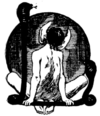
WHEN THE MAID RAKED OUT THE ASHES, SHE FOUND HIM IN THE SHAPE OF A LITTLE TIN HEART.
Then one of the little boys took up the soldier, and flung him right into the stove; nor did he give any reason for so doing, which plainly showed that the gnome in the box was at the bottom of it all.
The tin soldier was now lighted up by the flames, and felt a tremendous degree of heat; but whether it proceeded from the real fire, or from the fire of love, he could not exactly tell. His colour was completely gone, but whether this had happened during his travels, or was merely the effects of grief, nobody could guess. He looked at the little lady, and she looked at him, and he felt himself melting away; still he stood firm with his gun on his shoulder. The door now happened to open, and the wind caught up the dancer, who fluttered like a sylph right into the stove beside the tin soldier, and was instantly consumed by the flames. The tin soldier melted down to a lump, and next day, when the maid raked out the ashes, she found him in the shape of a little tin heart. Of the dancer nothing remained but the tinsel rose, and that was as black as a cinder.
The Snow Queen
IN SEVEN STORIES
Story the First— Which Treats of a Looking-Glass and its Broken Fragments
 ISTEN to me, and the story shall begin. When we shall have got to the end,
we shall know more than we do now; for it is about a very wicked hobgoblin!
He was one of the craftiest that ever lived; in short, he was the arch-fiend in
person. One day, when he was in a facetious humour, he made a looking-glass
which possessed the power of diminishing, almost to a nonentity, everything good
and beautiful mirrored on its surface, while all that was worthless or ill-looking
was brought out into still stronger relief Seen in this glass, the most lovely landscapes looked like cooked spinach, and the best amongst mankind appeared repulsive, and as if standing on his head. The countenances were so distorted
that they were unrecognisable; and if one had a single freckle, one would have been led
to believe that it extended over one's nose and mouth. The arch-fiend said this was extremely entertaining. If a good, pious thought entered a human being's brain, a flaw appeared in the looking-glass, and made the arch-fiend laugh at his cunning invention. All those who attended the hobgoblin's school—for he kept one—spread the fame of the wonderful glass in all directions, and maintained that people might now see, for the first time, how the world and its inhabitants really looked. They carried the glass about everywhere, till at last there was not a land nor a human being left but what had been seen distorted on its surface. They now presumed to attempt to scale the regions of the blessed; but the higher they flew with
the glass the more it cracked. They could scarcely hold it fast, yet they flew higher and higher, and still nearer the sun, till the glass shook so dreadfully in the process of fusion that it slipped out of their hands, and fell upon the earth, where it split into millions and billions of pieces; and
ISTEN to me, and the story shall begin. When we shall have got to the end,
we shall know more than we do now; for it is about a very wicked hobgoblin!
He was one of the craftiest that ever lived; in short, he was the arch-fiend in
person. One day, when he was in a facetious humour, he made a looking-glass
which possessed the power of diminishing, almost to a nonentity, everything good
and beautiful mirrored on its surface, while all that was worthless or ill-looking
was brought out into still stronger relief Seen in this glass, the most lovely landscapes looked like cooked spinach, and the best amongst mankind appeared repulsive, and as if standing on his head. The countenances were so distorted
that they were unrecognisable; and if one had a single freckle, one would have been led
to believe that it extended over one's nose and mouth. The arch-fiend said this was extremely entertaining. If a good, pious thought entered a human being's brain, a flaw appeared in the looking-glass, and made the arch-fiend laugh at his cunning invention. All those who attended the hobgoblin's school—for he kept one—spread the fame of the wonderful glass in all directions, and maintained that people might now see, for the first time, how the world and its inhabitants really looked. They carried the glass about everywhere, till at last there was not a land nor a human being left but what had been seen distorted on its surface. They now presumed to attempt to scale the regions of the blessed; but the higher they flew with
the glass the more it cracked. They could scarcely hold it fast, yet they flew higher and higher, and still nearer the sun, till the glass shook so dreadfully in the process of fusion that it slipped out of their hands, and fell upon the earth, where it split into millions and billions of pieces; and
